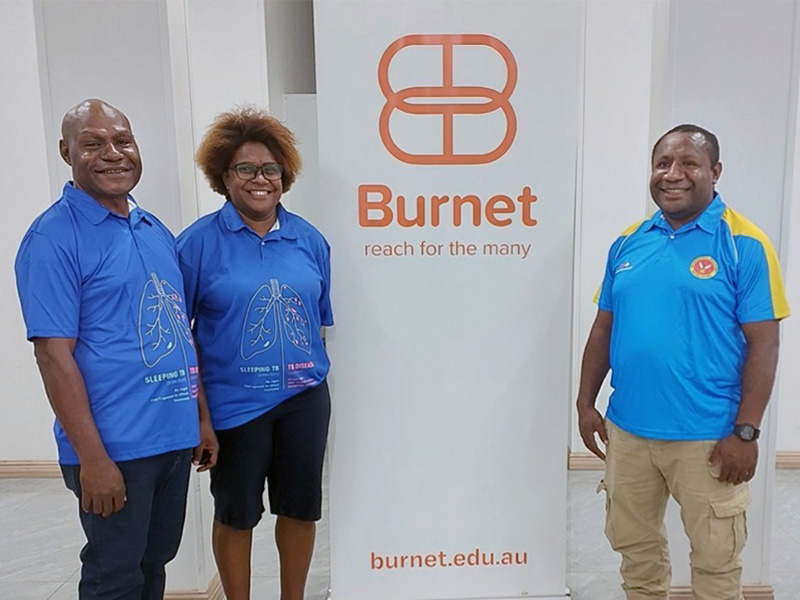
Pictured from left to right, Wilson Wazai, Hariet Topa and Malcolm Soporo.
The RID-TB Fellowship program offers a unique opportunity for Papua New Guinea (PNG) clinicians to enhance their skills in managing tuberculosis (TB), especially multidrug-resistant TB (MDR-TB).
Supported by Australian Government funding through the PNG-Australia Partnership, the collaboration between the Western Provincial Health Authority (WPHA), Burnet Institute, and other public health authorities across PNG, builds on the idea of 'centres of excellence' for TB care, by utilising local experience and expertise to build capacity for PNG health workers.
Daru has been identified as a hotspot for MDR-TB in PNG and serves as the focal location for current placements. The six-month secondment at Daru General Hospital (DGH) equips clinicians with a range of skills across TB epidemiology, detection, treatment and prevention.
This year's fellows are health extension officers Hariet Topa from Kavieng Provincial Hospital in New Ireland, Malcolm Soporo from Vanimo, West Sepik Provincial Hospital and Wilson Wazai based at Panaras Health Centre in New Ireland Province.
The fellows have immersed themselves in a structured program, enhancing their knowledge and experience in the programmatic and clinical management of TB.
This is Ms Topa’s second secondment at DGH.
"Coming to Daru opened my mind to the many different ways we can improve our program back home," she said.
"In my clinic, we don’t check everyone for TB, or if we diagnose them, we send them home to take medications. It’s centred on patient treatment only.
"But here in Daru, it's a more holistic approach — clinicians regularly check patients and see if they’re improving on their treatment and what we can do better for them."
Upon completion, fellows can apply their newly acquired expertise within their hospital or provincial health authority, contributing to the broader fight against TB in PNG.
While there are cases of TB in Vanimo, Mr Soporo said there have not been adequate investigations to locate MDR-TB.
"I'm learning all the ways and skills in getting samples and specimen collections," he said.
"I can share these resources and train other staff members when I return to my facility."
"If we improve collection samples, we are likely to find other cases of TB such as MDR-TB."
For Mr Wazai, who comes from a small health centre in rural PNG, this fellowship has significantly enhanced his practice.
"The program allows me to bring back management techniques and protocols to my community," he said.
"In my remote area, we lack essential screening facilities, such as X-ray machines, making this experience particularly impactful."
The comprehensive training in Daru includes participation in TB clinics for both paediatric and adult patients, ward rounds, data recording, active case findings through contact tracing, preventive therapy, and quality improvement activities.
Co-head of Tuberculosis Elimination and Implementation Science Dr Khai Lin Huang attributed the many years of the fellowship’s success to the strong collaborative efforts and effective partnerships.
"The achievements are a testament to what can be accomplished when we all work together towards a common goal," he said.

